The Axis of Genocide, the Axis of Resistance, and the Axis of Surrender
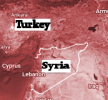 [Update 20 March 2025 - It appears that there has been another uprising in Turkey, What will this mean for Israel and Syria?] The Axis of Genocide: Turkey, run by its two-faced President Erdogan, is part of the axis of genocide.
[Update 20 March 2025 - It appears that there has been another uprising in Turkey, What will this mean for Israel and Syria?] The Axis of Genocide: Turkey, run by its two-faced President Erdogan, is part of the axis of genocide.

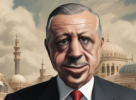 Is Turkey's role in the Middle East, especially regarding its support or provocation of wars and unrest, underestimated? Indeed, it often seems ignored. For instance, during the ongoing genocide against Gaza, much of Israel's oil has come from Azerbaijan, routed through Turkish ports.
Is Turkey's role in the Middle East, especially regarding its support or provocation of wars and unrest, underestimated? Indeed, it often seems ignored. For instance, during the ongoing genocide against Gaza, much of Israel's oil has come from Azerbaijan, routed through Turkish ports.
 On Wednesday 5 February, Queensland Senator Gerard Rennick asked of The Foreign Minister Senator Penny Wong, why, given her government's treatment of the former Syrian government of President Bashar al-Assad, she had said nothing about the large number of crimes committed against the people of Syria by the new regime of Mohammad al–Julani.
On Wednesday 5 February, Queensland Senator Gerard Rennick asked of The Foreign Minister Senator Penny Wong, why, given her government's treatment of the former Syrian government of President Bashar al-Assad, she had said nothing about the large number of crimes committed against the people of Syria by the new regime of Mohammad al–Julani. The letter below was sent to Prime Minister Albanese on 24 January 2025. In it, I refer to the
The letter below was sent to Prime Minister Albanese on 24 January 2025. In it, I refer to the  Australia, sadly, takes its orders from the US and so Trump's government and policies is of major importance to us here. Tulsi Gabbard, who is also a US soldier, has made it further than any other female politician in the US in terms of carving out an independent policy course and is now seeking confirmation of a Trump cabinet appointment as Director of US Intelligence.
Australia, sadly, takes its orders from the US and so Trump's government and policies is of major importance to us here. Tulsi Gabbard, who is also a US soldier, has made it further than any other female politician in the US in terms of carving out an independent policy course and is now seeking confirmation of a Trump cabinet appointment as Director of US Intelligence. Video inside by Kevork Almassian, a Syrian living in Germany, gives a complex overview of the situation in Syria. We have transcribed it with headings in square brackets for clarity, and included links and explanations for some specific names and places. While we have previously supported Bashar al-Assad's rule and elections amid brutal external interference, we were concerned by his departure from Syria and the Syrian Arab Army's decline.
Video inside by Kevork Almassian, a Syrian living in Germany, gives a complex overview of the situation in Syria. We have transcribed it with headings in square brackets for clarity, and included links and explanations for some specific names and places. While we have previously supported Bashar al-Assad's rule and elections amid brutal external interference, we were concerned by his departure from Syria and the Syrian Arab Army's decline. Independent Journalist Vanessa Beeley, who was based in Damascus up until the Al Nusra coup on 8 December 2024, discusses her evacuation from Syria, and what the end of the Assad Government means for the Syrian people and the future of foreign interference in the country. She also discusses the extreme suddenness of the coup and Russia's about-face, which seemed to lead so unexpectedly to Bashar al-Assad's very uncharacteristic resignation from his presidency.
Independent Journalist Vanessa Beeley, who was based in Damascus up until the Al Nusra coup on 8 December 2024, discusses her evacuation from Syria, and what the end of the Assad Government means for the Syrian people and the future of foreign interference in the country. She also discusses the extreme suddenness of the coup and Russia's about-face, which seemed to lead so unexpectedly to Bashar al-Assad's very uncharacteristic resignation from his presidency.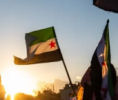 In 1980, the Swedish pop group ABBA released a hit song, “The winner takes it all”. As of December 8, 2024, the armed coalition headed by Ahmed al-Sharaa, formerly known by his nom de guerre, Abu Mohammed al-Jolani, might be singing that song. In every conflict, there are winners and losers. On a scale from 1 to 10, the various factions involved in the Syrian civil war from 2011 to 2024 are rated below.
In 1980, the Swedish pop group ABBA released a hit song, “The winner takes it all”. As of December 8, 2024, the armed coalition headed by Ahmed al-Sharaa, formerly known by his nom de guerre, Abu Mohammed al-Jolani, might be singing that song. In every conflict, there are winners and losers. On a scale from 1 to 10, the various factions involved in the Syrian civil war from 2011 to 2024 are rated below. From 26.50 minutes in you can hear a detailed account of how a Syrian mayor and the Christian town of Sadad, Syria - which is between Homs and Damascus, fought off the Isis branch Jabat al-Nusra/Al Nusra Front several years ago, at the cost of nearly 50 locals.
From 26.50 minutes in you can hear a detailed account of how a Syrian mayor and the Christian town of Sadad, Syria - which is between Homs and Damascus, fought off the Isis branch Jabat al-Nusra/Al Nusra Front several years ago, at the cost of nearly 50 locals.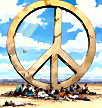 On December 9, Egypt accused Israel of illegally seizing a buffer zone in Syria. The area extends from the Golan Heights almost to the outskirts of Damascus. Israel troops and weaponry are now within hiking distance of the capital of Syria. Syria is now under the administration of Hayat Tahrir al-Sham, an armed opposition group from Idlib, which had been supported prior to 2017 by a covert CIA program.
On December 9, Egypt accused Israel of illegally seizing a buffer zone in Syria. The area extends from the Golan Heights almost to the outskirts of Damascus. Israel troops and weaponry are now within hiking distance of the capital of Syria. Syria is now under the administration of Hayat Tahrir al-Sham, an armed opposition group from Idlib, which had been supported prior to 2017 by a covert CIA program. We express our sorrow at the fall today of Damascus, Syria, - a secular democracy - to takfiri terrorists backed by Western powers. They are led by Ahmed Hussein al-Shar'a, commonly known as Abu Mohammad al-Julani. The US listed Al-Juliani as a 'Specially Designated Global Terrorist,' in May 2013, and four years later advertised a $10 million reward for information leading to his capture.
We express our sorrow at the fall today of Damascus, Syria, - a secular democracy - to takfiri terrorists backed by Western powers. They are led by Ahmed Hussein al-Shar'a, commonly known as Abu Mohammad al-Julani. The US listed Al-Juliani as a 'Specially Designated Global Terrorist,' in May 2013, and four years later advertised a $10 million reward for information leading to his capture. This discussion covers every important base on the push and pull factors for mass migration and the problems that ensue for the receiving populations on which it is imposed by elites. It is worth a library of books on the subject. Also, on Tommy Robinson, a surprising analysis.
This discussion covers every important base on the push and pull factors for mass migration and the problems that ensue for the receiving populations on which it is imposed by elites. It is worth a library of books on the subject. Also, on Tommy Robinson, a surprising analysis.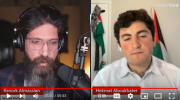 On SyrianaAnalysis, marking the 13th anniversary of the CIA-engineered dirty war in Syria, two Syrian journalists - Kervork Almassian and Hekmat Aboukhater discuss the appalling machinations of the anti-Syria lobby in Washington DC and the ignorance of the US public.
On SyrianaAnalysis, marking the 13th anniversary of the CIA-engineered dirty war in Syria, two Syrian journalists - Kervork Almassian and Hekmat Aboukhater discuss the appalling machinations of the anti-Syria lobby in Washington DC and the ignorance of the US public.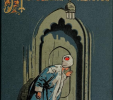
 This article was inspired by Israeli and western press characterisation of Hamas-tunnels in Gaza, as if they were novel and somehow shameful and outrageous defensive constructions, when Israel itself has plenty.
This article was inspired by Israeli and western press characterisation of Hamas-tunnels in Gaza, as if they were novel and somehow shameful and outrageous defensive constructions, when Israel itself has plenty.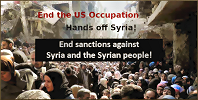 Syria is in significant difficulties at present with pressure on all sides from the U.S.
Syria is in significant difficulties at present with pressure on all sides from the U.S.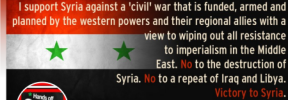 Hands Off Syria is calling for a rally in support of Syria. After the catastrophic earthquake, people around the world want to help Syria, however, the criminal US sanctions are impeding assistance, in particular reconstruction.
Hands Off Syria is calling for a rally in support of Syria. After the catastrophic earthquake, people around the world want to help Syria, however, the criminal US sanctions are impeding assistance, in particular reconstruction.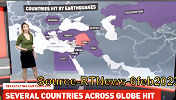 February 6, 2023: Latakia, Syria At least 780 are dead in Syria, with another 2,300 injured according to the Syrian Arab News Agency (SANA) after a massive 7.8 magnitude earthquake struck at 4:17 am local time today. Rescue teams look for survivors under the rubble of a collapsed building after an earthquake in the regime-controlled northern Syrian city of Aleppo on February 6, 2023.
February 6, 2023: Latakia, Syria At least 780 are dead in Syria, with another 2,300 injured according to the Syrian Arab News Agency (SANA) after a massive 7.8 magnitude earthquake struck at 4:17 am local time today. Rescue teams look for survivors under the rubble of a collapsed building after an earthquake in the regime-controlled northern Syrian city of Aleppo on February 6, 2023.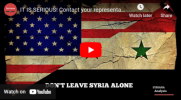 The theft of Syrian oil by US forces illegally occupying Syria, and the US-NATO backed destruction of infrastructure and economy, have left Syrians in extreme danger of dying from cold and starvation this winter. Before the war Syria, which is the seat of one of the earliest civilisations, had a healthy economy and was host to many refugees from neighboring states.
The theft of Syrian oil by US forces illegally occupying Syria, and the US-NATO backed destruction of infrastructure and economy, have left Syrians in extreme danger of dying from cold and starvation this winter. Before the war Syria, which is the seat of one of the earliest civilisations, had a healthy economy and was host to many refugees from neighboring states.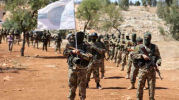 The Syrian Arab Army (SAA) and Russian warplanes shelled positions of Hayat Tahrir al-Sham (HTS), the Al Qaeda affiliate in Syria, on November 6 in Idlib province. Some of the terrorists killed were: Abdul Minam Muhati, Radwan Hussain Muhayer, Abu Dawoud al-Filistini, Mohammad Ali al-Kadour, Abu Hussein al-Raddad, Abu Hajat al-Chad, Amro abu Layth al-Askandarani, and Mohammed Suliaman al-Ali.
The Syrian Arab Army (SAA) and Russian warplanes shelled positions of Hayat Tahrir al-Sham (HTS), the Al Qaeda affiliate in Syria, on November 6 in Idlib province. Some of the terrorists killed were: Abdul Minam Muhati, Radwan Hussain Muhayer, Abu Dawoud al-Filistini, Mohammad Ali al-Kadour, Abu Hussein al-Raddad, Abu Hajat al-Chad, Amro abu Layth al-Askandarani, and Mohammed Suliaman al-Ali.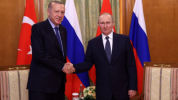 Russian President Vladmir Putin and Turkish President Recep Erdogan held a four-hour meeting on August 5 in Sochi which may change the course of the Middle East, and end the US occupation of Syria.
Russian President Vladmir Putin and Turkish President Recep Erdogan held a four-hour meeting on August 5 in Sochi which may change the course of the Middle East, and end the US occupation of Syria.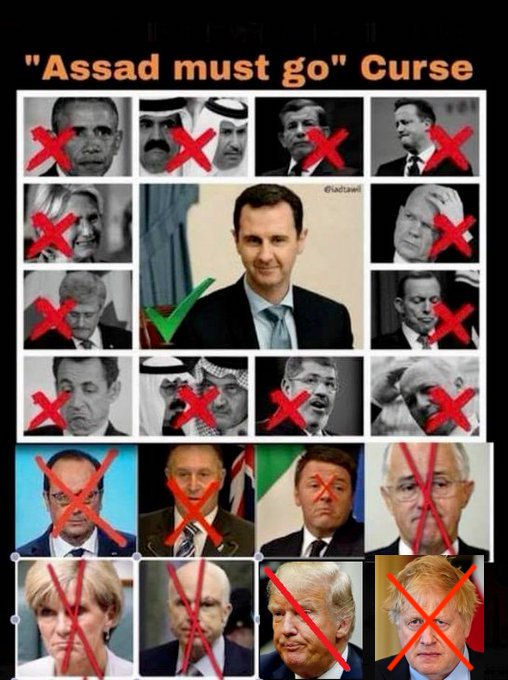
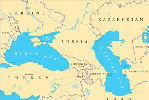 What was the importance of Putin's attendance at the Caspian Summit, beginning on June 29, 2022 and the progress of associated alliances? This was a subject of some interesting speculation in a July 2 edition of The Duran, which I have embedded and transcribed below this introduction. For some time now the US and Russia have had increasing proxy confrontations in Russia's backyard, in the areas around and below the Caspian Sea and the Black Sea.
What was the importance of Putin's attendance at the Caspian Summit, beginning on June 29, 2022 and the progress of associated alliances? This was a subject of some interesting speculation in a July 2 edition of The Duran, which I have embedded and transcribed below this introduction. For some time now the US and Russia have had increasing proxy confrontations in Russia's backyard, in the areas around and below the Caspian Sea and the Black Sea.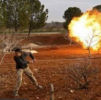 The Syrian Arab Army (SAA) repelled an attack by terrorists on Saraqib on Wednesday and in the early hours of Thursday. Saraqib is a city in northwestern Syria, located east of Idlib. The small city fell to terrorists in 2012 and was liberated by the SAA in 2020. [This story is republished from
The Syrian Arab Army (SAA) repelled an attack by terrorists on Saraqib on Wednesday and in the early hours of Thursday. Saraqib is a city in northwestern Syria, located east of Idlib. The small city fell to terrorists in 2012 and was liberated by the SAA in 2020. [This story is republished from
Recent comments